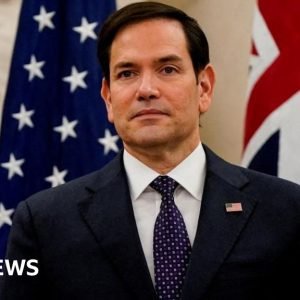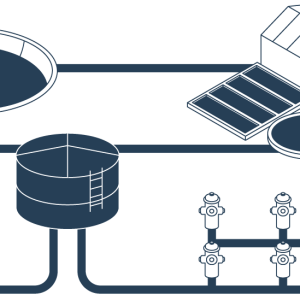
For two years, a rural town in the middle of Michigan has been embroiled in a civil war over plans by a Chinese-owned electric vehicle battery company to build a $2.4 billion factory.
On Tuesday, the local furor collided with presidential politics as the Trump campaign sought to leverage anti-China sentiment and concerns over the future of the electric vehicle industry in Michigan for political gain.
The fight over the E.V. battery facility has turned Green Charter Township, which is about 60 miles north of Grand Rapids, into the latest battleground over Chinese investment in the United States. Residents have expressed various concerns about the factory, including that it will be used by China to spy on Americans and will pollute the local environment.
The debate over the intentions of the Chinese company, Gotion, has led to angry town hall meetings, the ousting of the township’s board in an election last November and litigation over the future of the project.
Michigan is a pivotal swing state in the November election, and a New York Times/Siena poll this month showed Vice President Kamala Harris, the Democratic nominee, leading former President Donald J. Trump, the Republican nominee, by 4 percentage points.
At a 150-acre horse farm owned by one of the most vocal “No Gotion” activists, Senator JD Vance, Mr. Trump’s running mate, blamed Ms. Harris for Gotion’s arrival in Michigan. In 2022, Ms. Harris cast the deciding vote that enabled passage of the Inflation Reduction Act, which created billions of dollars in new green energy subsidies and has lured foreign companies to the United States.
“Kamala Harris not only wants to allow the Chinese Communist Party to build factories on American soil, she wants to pay them to do it with our tax money,” Mr. Vance said on Tuesday afternoon. “Democrats are helping China to destroy and replace our auto industry from the inside out.”
The crowd of approximately 500 supporters of the Trump campaign, some of whom were wearing shirts accusing Chinese companies of using forced labor, erupted in boos when Mr. Vance mentioned Gotion.
During his brief tenure in the Senate, where he represents Ohio, Mr. Vance has been hawkish on China. He introduced a 2024 bill to combat Chinese currency manipulation and another piece of legislation that would ensure that inventions created by taxpayer-funded research cannot be manufactured in adversarial countries such as China.
Mr. Trump has also talked tough on China, imposing steep tariffs on its exports while president and moving to ban TikTok from U.S. app stores over national security concerns. He has since equivocated on TikTok, saying that, if elected, he would “save TikTok.” And despite his anti-China views, as president Mr. Trump welcomed U.S. investment by Taiwan’s Foxconn, which derives much of its revenue from its Chinese factories.
At the 2018 groundbreaking for Foxconn’s $10 billion plant in Wisconsin to make flat-screen televisions, Mr. Trump called the project the “eighth wonder of the world.” Plans for the factory later sputtered amid changing market dynamics and much of the planned site remains undeveloped.
Mr. Vance’s decision to wade into the fight over Gotion came in the wake of another shift by Mr. Trump, who earlier this year indicated openness to foreign investment. During remarks in March and at his July convention speech, Mr. Trump suggested that he would welcome foreign companies, including those from China, building car factories in the U.S. if they were staffed by American workers.
“If they want to build a plant in Michigan, in Ohio, in South Carolina, they can, using American workers, they can,” Mr. Trump said in March, adding that they could not send Chinese workers staff those plants. “If they want to do that, we’re welcome, right?”
Gotion’s vice president of North American manufacturing, Chuck Thelen, embraced those remarks during a virtual town hall last month, suggesting that Mr. Trump was supportive of Chinese companies such as Gotion setting up shop in the U.S.
Last week, Mr. Trump changed his tenor on the issue. He said that he opposed the Gotion project, which has been supported by Michigan Democrats. They include Gov. Gretchen Whitmer, who has praised it as a win for the state. The battery factory is projected to create more than 2,000 jobs in the region.
“The Gotion plant would be very bad for the State and our Country. It would put Michiganders under the thumb of the Chinese Communist Party in Beijing,” Mr. Trump wrote on social media. “I AM 100% OPPOSED!”
Mr. Thelen said in a statement that he had not meant to suggest that Mr. Trump supported the Gotion facility but noted that the company had a good relationship with the Trump administration. He said that the company was moving forward with its plans.
“Speaking last month in Grand Rapids, former President Trump supported the onshoring of electrification manufacturing in our state and the United States by Chinese-affiliated companies,” Mr. Thelen said. “Trump wants the people of Michigan and our local economy to thrive from these types of jobs, and so do we.”
Gotion received $800 million in state subsidies, such as grants and tax exemptions, from Michigan’s strategic fund. The company could also be eligible to receive tax credits from the Inflation Reduction Act.
The Coalition for a Prosperous America, which represents American manufacturers, estimates that Chinese companies could gain access to $125 billion in U.S. tax credits related to “green energy manufacturing” investments. Republicans in Congress have introduced legislation that would prevent Chinese companies from accessing such tax credits.
The debate over the future of Gotion has led to arguments about the environment, national security and the local economy.
“It’s important for Michigan to have jobs in these new industries,” said Erik Gordon, a professor at the University of Michigan’s Ross School of Business. “The question is, should we be giving subsidies to a Chinese company so we can have these jobs or could there be another alternative?”
The Biden administration has expressed concern about Chinese companies benefiting from the 2022 climate and tax law but officials have said that the legislation does not allow them to exclude foreign companies from getting tax incentives.
The Harris campaign did not immediately have a comment on Mr. Vance’s criticism of the vice president.
In June, the Committee on Foreign Investment in the U.S. proposed adding a military facility located near the planned Gotion factory to a list of sites that would give the investment review panel more authority to block foreign transactions. However, the rule would not be retroactive and could only obstruct Gotion from buying additional land in the area.
Mr. Vance, speaking after his prepared remarks, made no promises about what Mr. Trump might be able to do to stop construction of the Gotion factory if he is elected.
“Hopefully it progresses slowly and there is something we can do about it,” Mr. Vance told reporters.
The feud has divided Green Charter Township and the surrounding area in Michigan, leading to protests at town meetings and an aggressive “No Gotion” social media campaign. The township’s Republican board of trustees that had approved the Gotion factory was voted out last November and replaced with officials who pledged to stop the project.
Those efforts, which have included a move to block Gotion from accessing the local water supply, have so far been stymied by a lawsuit that the company filed against the township that alleges the officials are backing out of a legally binding agreement.
At Mr. Vance’s rally, many expressed hope that a Trump administration would support their efforts to stop Gotion.
“I’m really worried that they’re going to end up polluting the river,” Don Taylor, 82, of Hersey, Mich., said. “I don’t trust the communist Chinese, either.”
Lori Brock, leader of the movement to stop Gotion and owner of the Majestic Friesians Horse Farm where Mr. Vance spoke, said on Tuesday that it was “reckless and absurd” that the state and federal government are subsidizing a company controlled by China, which has a history of spying on the United States.
“We are against it and we don’t want it here,” Ms. Brock said. “The Chinese Communist Party is the biggest national security threat that our country has faced in decades.”
Michael C. Bender contributed reporting from Big Rapids, Mich.







